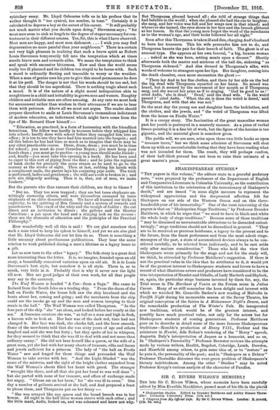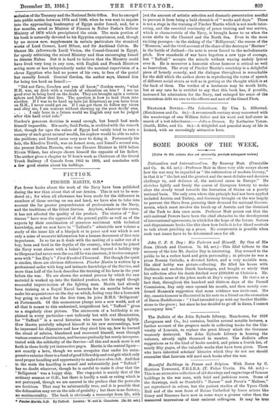SIR C. RIVERS WILSON'S MEMOIRS.f Tux late Sir C. Rivers
Wilson, whose memoirs have been carefully edited by Miss Everilda MacAlister, passed most of his life in the placid
• Shaksperian Studies. Edited by Brander Matthews and Ashley Horace Thorn- dike. Columbia University Press. ilea. net.]
t Chapters from My Official Life. By Sir C. Rivera Wilson. London: E.Arnoik [12s. ad. net.]
seclusion of the Treasury and the National Debt Office. But he emerged into public notice between 1876 and 1880, when he was sent to inquire into the approaching bankruptcy of Egypt under Ismail, and, for a few months, acted as Minister of Finance in Nubar Pasha's Reform Ministry of 1878 which precipitated the crisis. The Main portion of his book is naturally devoted to his Egyptian experiences, and, though by no moans new. supplements in certain particulars the standard works of Lord Cromer, Lord Milner, and Sir Auckland Colvin. He blames Mr. (afterwards Lord) Vivian, the Consul-General in Egypt, for openly criticizing the mixed Ministry and thus encouraging Ismail to dismiss Nubar. But it is hard to believe that the Ministry could have lived very long in any case, with English and French Ministers acting more or less independently under the nominal supervision of a clover Egyptian who had no power of his own, in face of the genial but rascally Ismail. General Gordon, the author says, blamed him for being too hard on Ismail :—
"Did not Cave, Goschen and you all know," Gordon wrote, "what H.H. was, an Arab with a varnish of education on him ? I see no good ever in being hard on the Arabs. They are brought up in a certain sphere and follow that lino. The question is bow to lead them into another. If I was to be hard up here [at Khartum] as you have been on H.H., I never could get on. If I can get them to follow my views and obey. me, I am content without showing up the poor devils' sins. . . . I only hope in a future world we English may not be judged after this hard cruel rule."
Gordon's generous doctrine is sound enough, but Ismail had made himself impossible. His uncle, Said Pasha, is credited with the remark that, though for ages the rulers of Egypt had vainly tried to ruin a country of such great natural wealth, his nephew would be able to solve the problem; and Ismail came very near to doing it. Fortunately his heir, the Khedive Tewfik, was an honest man, and Ismail's second son, the present Sultan Hussein, who was Finance Minister in 1878 before Rivers Wilson, has always shown himself the opposite of his father. The author gives a chapter to W.lson's work ae Chairman of the Grand Trunk Railway Lf Canada from 1895 to 1909, and concludes with a few good stories about his bulldogs.



































 Previous page
Previous page